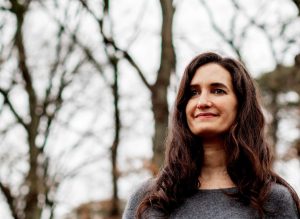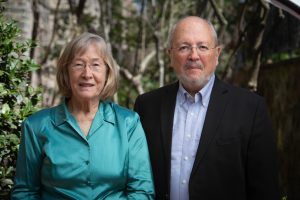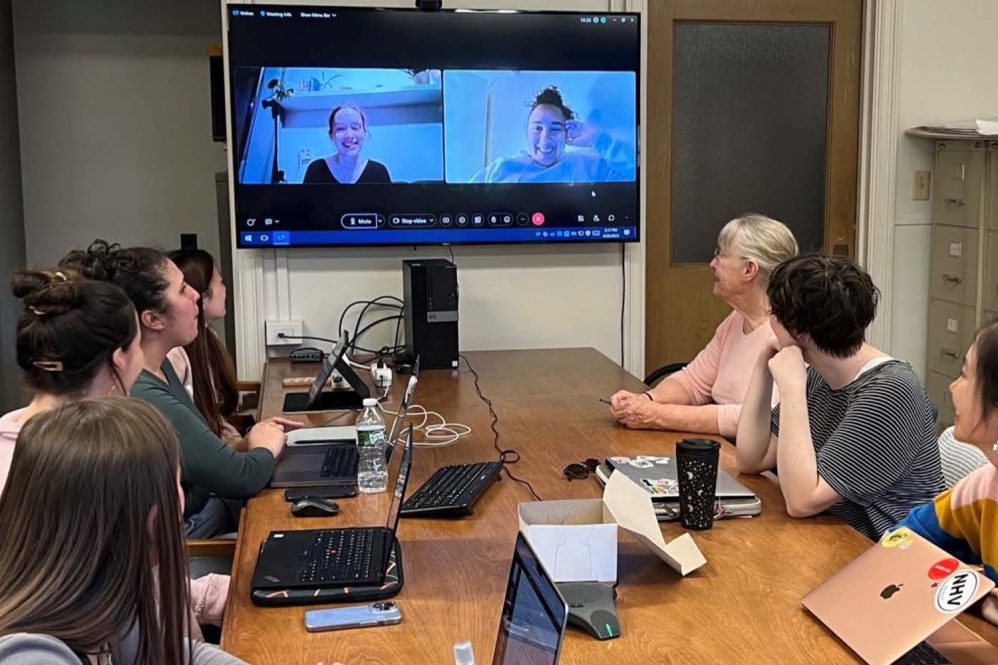Saskia van Schaik was a graduate student in the Netherlands 15 years ago, looking for an opportunity to study abroad when UConn professors Sara Harkness and Charles Super invited her to come to UConn.
“I learned so much from that experience,” she says. “Being able to see what class is like somewhere else, what research is like at a different type of university, what life is like in a different country was so eye opening.”
But there was a hitch. Van Schaik’s personal budget took a hit to make the trip happen and she was on the hook for travel and living arrangements and her own itineraries, she says. Making the trip come together was “a project.”
She wasn’t deterred, though, and that visit eventually led to a six-month residency at UConn starting in February 2020, this time as a Fulbright Visiting Scholar, and a continuing connection to the Center for the Study of Culture, Health, and Human Development (CHHD), headed by Harkness and Super, both affiliated with the Department of Human Development and Family Sciences in the College of Liberal Arts and Sciences.

About a year ago, van Schaik was at home in the Netherlands, where she’s an assistant professor at Radboud University, and Harkness and Super were visiting when they conceived the idea for a virtual study abroad experience that would remove the financial and travel burdens that once hampered van Schaik.
With UConn’s support for a remote exchange, two UConn graduate students joined in remotely on van Schaik’s Fall 2022 class at Radboud: Policy, Paradigms, and Human Development. Then, in Spring 2023, two Radboud students joined Harkness’s UConn class on culture, health, and human development.
“This arrangement doesn’t cost the students anything more than the tuition they’re already paying,” Harkness says, explaining the UConn students enrolled in an independent study with her in Fall 2022 and got a grade and UConn credit for the Radboud exchange. “All it requires is the professor to take on a couple of extra students in their class.”
Harkness says the two classes were chosen in part because neither was offered at the students’ home university, giving the four “exchange” students another advantage.
“After the first or second class this spring, I was talking with the Radboud students and they said they were enjoying the experience, especially because instruction in the U.S. is so different from how we do our classes,” van Schaik says. “It wasn’t just the content that was so different, it was the method, the way of teaching.”
In the Netherlands, graduate level classes are taught in much the same way as undergraduate classes, structured and rooted in lectures, she explains. So, the Dutch students saw the discussion and collaboration that happened in Harkness’s class as a novel approach to teaching.
Conversely, and more content focused, UConn students took note of the way the Netherlands puts effort into preventive programs, like ways to prevent child abuse or school dropouts, while the U.S. generally takes an interventionist approach to those issues, van Schaik says.
“It’s fascinating to learn about those differences because you kind of assume everyone does something the same way but that’s not the case,” she adds.
‘Abundance of diverse perspectives’
UConn Ph.D. student in HDFS Darlis Juvino says she participated in the exchange – not only did she join the Radboud class in the fall, but she also was in the UConn class during the spring – at the urging of Harkness and was happy to do so because van Schaik’s class aligned with her research at the time.
“Generally, it is my belief that the majority of educational content within American universities tends to be predominantly centered on the United States,” Juvino says. “While this may be understandable, it presents a limitation in preparing students to become leaders in their respective fields. Given the current era of widespread globalization, it is essential to actively seek out diverse cultural perspectives, or at least develop familiarity with various viewpoints.”
She adds that the classes allowed her to network with peers in the Netherlands and Aruba – one of the four countries of the Kingdom of the Netherlands and from where one student hails – and consider the possibility for future research collaborations.
“One of the biggest takeaways from the classes has been the abundance of diverse perspectives that we should be mindful of when we communicate, work, and create relationships with those around us,” Juvino says.
But when relying on technology, in this case a WebEx connection, there are bound to be snafus.
Harkness taught the last class of the spring remotely, somewhat ironically from the Netherlands while visiting van Schaik. Her UConn students back at home joined remotely too, along with their two Dutch classmates.
Harkness says one of the Dutch students remarked at the start of that class that it was nice to finally see the faces of their Storrs classmates. Apparently, the camera position in the classroom never allowed them to see what their UConn peers looked like.
“We need to work on that,” Harkness says, “but hopefully these students have built relationships with each other that carry beyond the class.”
Radboud graduate student Liesje Proveyer says she learned a lot about U.S. culture, including some of its biggest societal issues and the variety of perspectives on how to rank and fix them.
“By attending this seminar, I got to know what it was like to study at a university in the U.S.,” Proveyer says. “There are truly many roads to Rome and that is something this experience has taught me. Also, sharing a classroom with students outside Radboud University helped me gain insights into different perspectives. We might not be aware, but the context we are in makes us a bit biased about the topics of interest and the perspectives we take when exploring these topics.”
UConn Ph.D. student Kayla O’Connor says she took Harkness’s Spring 2023 class as an elective because, as a health promotions sciences student, she’s interested in how culture influences human health and behavior.
“From a health promotion perspective, learning about other ways of being and public health initiatives in other countries from those with a genuine, first-hand perspective can broaden how we think about health promotion and spark ingenious ideas,” she says.
Graduate Certificate, New Undergraduate Minor
Harkness and Super have based their careers on building such cross-cultural awareness.
The CHHD offers a Graduate Certificate in Culture, Health, and Human Development, a program that culminates with publishable research and a monetary award toward presenting students’ work at a conference. Also, a new HDFS undergraduate minor in culture, health, and human development allows younger college students to develop their cultural awareness.

“With all of the attention paid to discrimination in society, we feel this kind of cross-cultural communication, community building, and knowledge needs to be a foundation for a lot of those conversations, so they can be more productive and move beyond just feeling badly about all of the terrible things that have happened and are still happening,” Harkness says. “We have a sense of mission about this, and it is part of a bigger effort. We’re so grateful to Global Affairs for supporting and understanding what it is that we’re trying to do with this.”
Harkness says they’d like to expand the virtual exchange “carefully and thoughtfully to a wider array of students and faculty,” mostly those affiliated with CHHD. At Radboud, students would be limited to those connected to the Behavioral Science Institute there.
“Having students from the Netherlands, and one of them with the additional background from Aruba, just tremendously enriched the class,” Harkness says. “That’s the epitome of a wonderful class – when you have gathered, in one group, people who bring different life experiences and cultural backgrounds to share with each other and learn from each other.”



